初中新概念英语第二册 Lesson 1 A Private Conversation 课件+内嵌音频
文档属性
| 名称 | 初中新概念英语第二册 Lesson 1 A Private Conversation 课件+内嵌音频 |
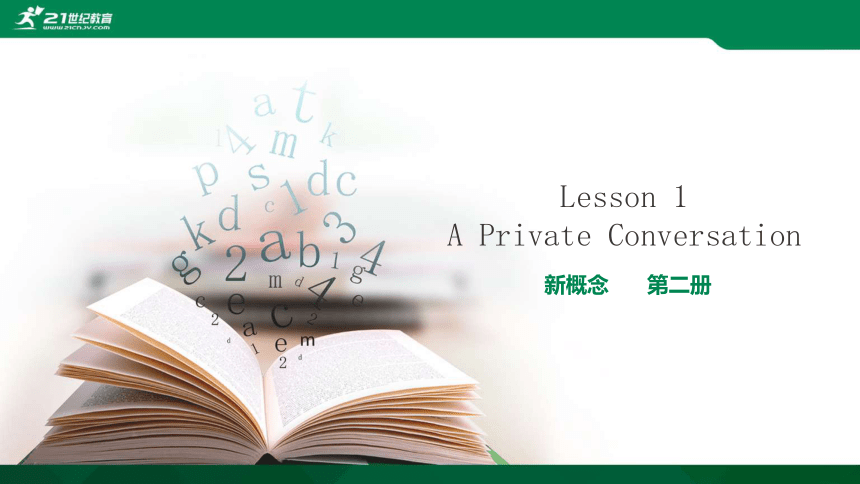
|
|
| 格式 | pptx | ||
| 文件大小 | 53.8MB | ||
| 资源类型 | 试卷 | ||
| 版本资源 | 新概念英语 | ||
| 科目 | 英语 | ||
| 更新时间 | 2023-06-23 00:00:00 | ||
图片预览

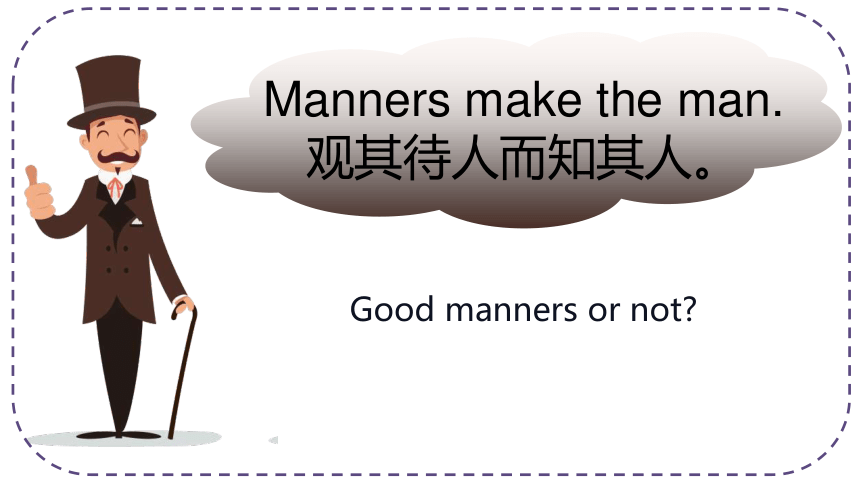



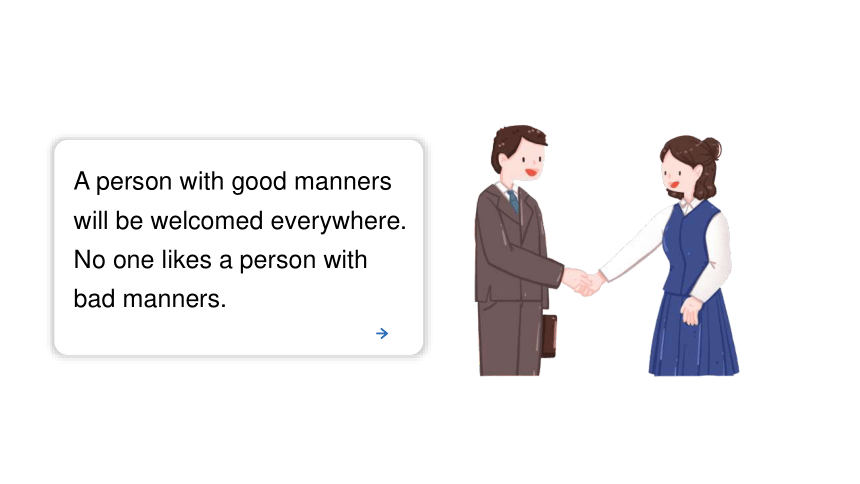
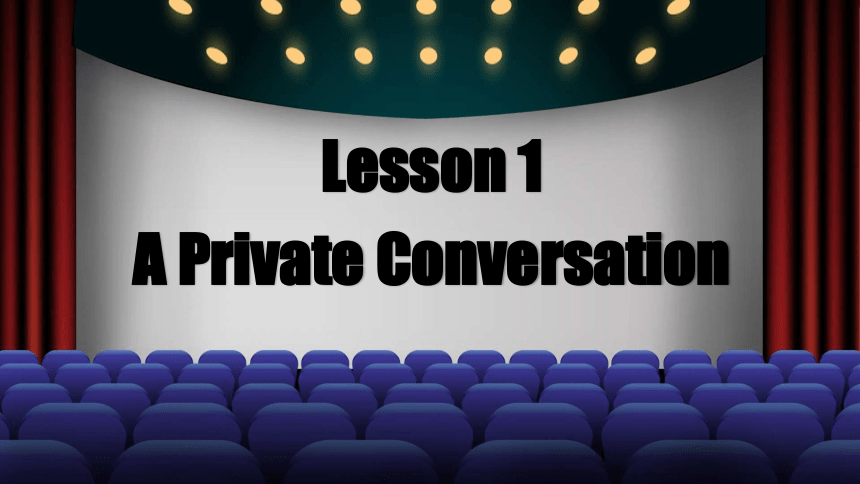
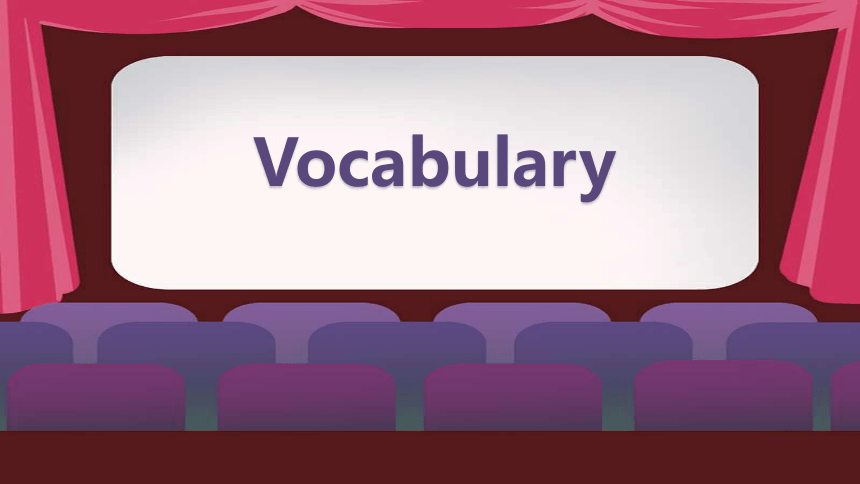
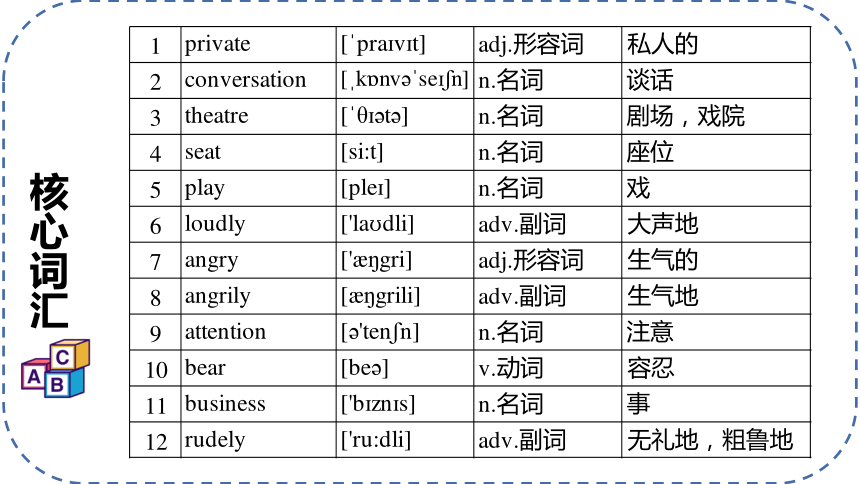
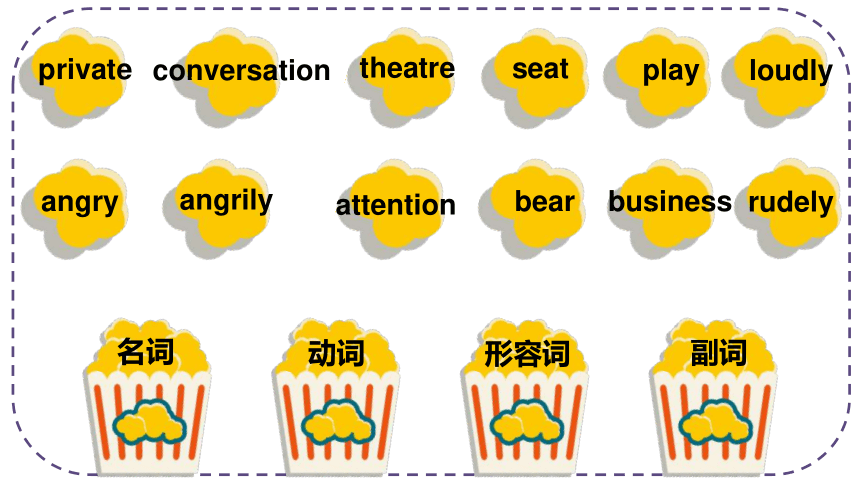
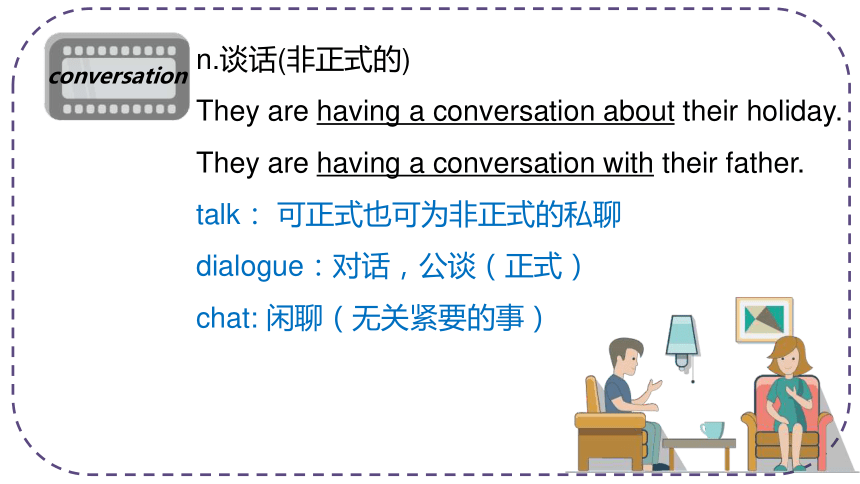
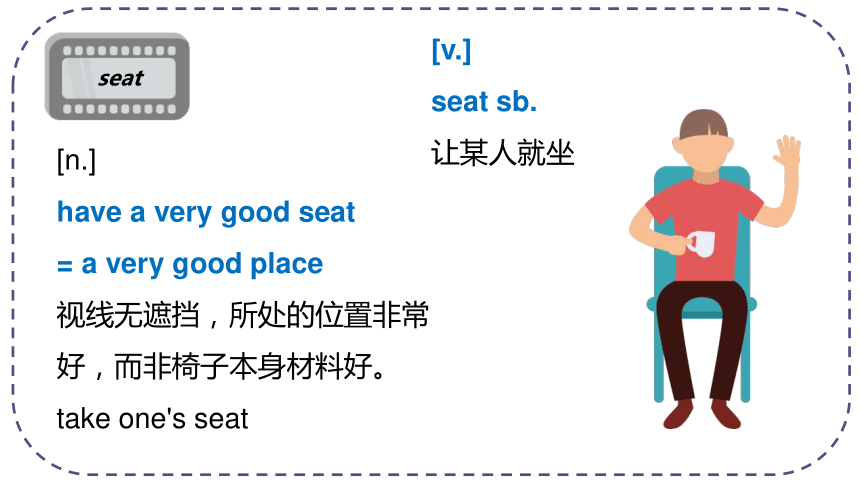
文档简介
(共58张PPT)
Lesson 1
A Private Conversation
新概念 第二册
Manners make the man.
观其待人而知其人。
Good manners or not
A person with good manners will be welcomed everywhere. No one likes a person with bad manners.
Lesson 1
A Private Conversation
Vocabulary
核心词汇
conversation
theatre
seat
attention
play
angry
business
private
loudly
angrily
rudely
bear
名词
动词
副词
形容词
conversation
n.谈话(非正式的)
They are having a conversation about their holiday.
They are having a conversation with their father.
talk: 可正式也可为非正式的私聊
dialogue:对话,公谈(正式)
chat: 闲聊(无关紧要的事)
seat
[n.]
have a very good seat
= a very good place
视线无遮挡,所处的位置非常好,而非椅子本身材料好。
take one's seat
[v.]
seat sb.
让某人就坐
business
1. 事情(私人的)
It's none of my business.
thing 泛指事情
It's an important thing!
2. 生意,出差
Business is business.
on business 出差
I'm on business in Beijing.
attention
要想表达注意的程度只需在attention前加形容词即可:
pay no/attention to 不注意
pay a little attention to 稍加注意
pay much attention to 比较注意
pay more attention to 更加注意
pay great attention to 非常注意
pay attention to doing sth.注意做某事
要想表达注意的程度只需在attention前加形容词即可:
pay no atntion to 不注意
pay a little attention to 稍加注意
pay much attention to 比较注意
pay more attention to 更加注意
pay great attention to 非常注意
bear
polar bear 北极熊
give sb a bear hug
给某人热情(热烈)的拥抱
bear
[v.] 忍受
My sister can not bear mouse.
我姐姐可无法忍受老鼠。
同义词:
stand 忍受
put up with sb. / sth. 容忍
He can't bear/stand/put up with hot weather.
他受不住炎热的天气.
I can’t bear/stand/put up with the noise.
我受不了这噪音。
v. 生育
bear a child 生孩子
She was born in 1954. 她生于1954年.
He was born in Germany. 他出生在德国。
bear
private
private adj. 私人的
private school 私立学校
private letter 私人信件
privacy/ pr v si/ n.隐私
public adj. 公众的,公开的
public school 公立学校
public place 公众场所
angry
有关“生气”的表达
cross=angry(英式)
He was cross.
mad(美式)
The boss got mad.
angry adj. 生气的
be angry with sb.
生某人的气
be angry at/about sth.
为某事而生气
adj. adv.
形容词 副词
loud loudly
angry angrily
rude rudely
形容词—副词规则
一般直接+ly, 如quickly,sadly;
以辅音+y结尾的,变y为i加ly,
如lazy-lazily, happy-happily;
以ll结尾的,直接加y,如fully
以辅音+le结尾的,变e为y,
如:able-ably, single-singly;
5. 以元音+e结尾的,去e加ly,如true-truly
The bear is angry now.
It looks at us .
angrily
It is a beautiful peacock.
It dances .
beautifully
The mother lion is gentle.
She touches the baby lion .
gently
本身既是形容词也是副词,无需改变 fast----fast
early----early
hard----hard
late----late
far----far
注意
Listening
Why did the writer complain
to the people behind him
Last week I went to the_________. I had a very good______. The play was very interesting. I did not______ it. A young man and a young woman were sitting behind me. They were talking________. I got very________. I could not hear the actors. I turned round. I looked at the man and the woman_________. They did not pay any__________. In the end, I could not bear it. I turned round again.
‘I can't hear a word!’ I said angrily.
‘It's none of your___________,’ the young man said_________. “This is a __________conversation!”
theatre
seat
enjoy
loudly
angry
angrily
attention
business
rudely
private
Reading
went to the theatre.
had a very good seat.
did not enjoy it.
The play was very interesting.
Last week
A young man and a young woman were sitting behind me. They were talking loudly.
I
I
I
A young man and a young woman were sitting behind me. They were talking loudly.
The play was very interesting.
Section 1
原因:be doing 是介绍背景的最佳选择,
可以起到加强印象的效果。
go to the+地点:表示去某地干特定某事
以下几种表达都是“看电影”的意思
go to the cinema
go to the film
go to the movies
go to the +人+'s:表示去这个人开的店/家
go to the doctor's 去诊所看病
go to the butcher's 去肉店买肉
go to the grocer's 去杂货店买东西
go to +地点:去某地做相关的事
go to school 去上学
go to church 去做礼拜
go to hospital 去看病
go home 回家(休息)
interesting adj .引起兴趣的,有趣的
This man is very interesting.
The book is so interesting that I do not want to put it down.
interested adj. 对…感兴趣的
be interested in sth/ doing sth.
I am interested in sports.
enjoy v.享受…之乐,欣赏,喜爱
enjoy doing sth.
enjoy swimming 喜欢游泳
enjoy one's dinner 饭吃得津津有味
enjoy oneself 玩得开心
=have fun=have a good time
went to the theatre.
had a very good seat.
did not enjoy it.
The play was very interesting.
Last week
A young man and a young woman were sitting behind me. They were talking loudly.
I
I
I
A young man and a young woman were sitting behind me. They were talking loudly.
The play was very interesting.
Recite
got very angry.
could not hear the actors.
turned round.
looked at the man and the woman angrily.
They did not pay any attention.
I
I
I
I
They did not pay any attention.
Section 2
got 变得
I am/was angry.(是个事实)
I got angry.(强调变化过程)
turn round 英式英语
turn around 美式英语
turn left 向左转
turn right向右转
turn over翻身
got very angry.
could not hear the actors.
turned round.
looked at the man and the woman angrily.
They did not pay any attention.
I
I
I
I
They did not pay any attention.
Section 2
could not bear it.
turned round again.
'I can't hear a word!'
said angrily.
In the end,
'It’s none of your business,'
the young man said rudely.
'This is a private conversation!'
I
I
I
'It’s none of your business,'
the young man said rudely.
'This is a private conversation!'
Section 3
a word 在此等于一句话
He didn't say a word.
重要谚语:
Actions speak louder than words.
行胜于言。
could not bear it.
turned round again.
'I can't hear a word!'
said angrily.
In the end,
'It’s none of your business,'
the young man said rudely.
'This is a private conversation!'
I
I
I
'It’s none of your business,'
the young man said rudely.
'This is a private conversation!'
Section 3
Summary writing
1. Where did the writer go last week
2. Did he enjoy the play or not
3. Who was sitting behind him
4. Were they talking loudly, or were they talking quietly
5. Could the writer hear the actors or not
6. Did he turn round or not
7. What did he say
8. Did the young man say, ‘The play is not interesting,'
or did he say,'This is a private conversation!'
Grammar
简单陈述句
陈述句用来叙述一件事情。
每个句子都包含着一个概念,告诉我们一件事情。
凡是叙述一件事情的陈述句都是简单陈述句。
简单陈述句的语序
一个完整的简单陈述句可以由6部分组成,但是并不是每个句子都有这么多组成部分。
问:一个最简单的陈述句至少应包括哪几个部分?
答:一个主语和一个谓语。
6 1 2 3 4 5 6
when Who Which What Action Who Which What How Where When
Last week I went to the theatre
I had a good seat
The play was very interes-ting
动词
连系动词
主要动词
行为动词
常见助动词
辅助动词
常见情态动词
状态系动词:be (am / is / are / was / were)
持续系动词:keep / remain / stay / lie
感官系动词:look / feel / taste / smell / sound
表象系动词:seem / appear / look
变得系动词:become / turn / get / grow
终止系动词:prove / turn out
不及物动词 laugh / smile / look / listen
及物动词 see / hear / drink / eat
do / does / did
have / has / had
will / shall
can / may / must / need
could / should / would / might
have (has) to / had better
三种简单句的基本句型
1. 主语+谓语
2. 主语+谓语+宾语
3. 主语+系动词+表语
请将课文中的句子分类。
Exercise
【Challenge yourself!】
【Easy】Write the correct form of the given word.
1. My mother (buy) an iPad for me last Sunday.
bought
【Medium】Rewrite these sentences without changing their original meanings.
2. I went to see a film with an old friend yesterday.
I went to the cinema with an old friend yesterday.
3. Can you say it again I heard nothing. There was too much noise.
Can you say it again I didn't hear a word. There was too much noise.
【Hard】Rearrange the words to make a sentence..
4. to / round / the / turned / man / at / I / look
I turned round to look at the man.
5. book / I / interesting / find / an / it
I find it an interesting book.
谢谢
21世纪教育网(www.21cnjy.com) 中小学教育资源网站
有大把高质量资料?一线教师?一线教研员?
欢迎加入21世纪教育网教师合作团队!!月薪过万不是梦!!
详情请看:
https://www.21cnjy.com/help/help_extract.php
Lesson 1
A Private Conversation
新概念 第二册
Manners make the man.
观其待人而知其人。
Good manners or not
A person with good manners will be welcomed everywhere. No one likes a person with bad manners.
Lesson 1
A Private Conversation
Vocabulary
核心词汇
conversation
theatre
seat
attention
play
angry
business
private
loudly
angrily
rudely
bear
名词
动词
副词
形容词
conversation
n.谈话(非正式的)
They are having a conversation about their holiday.
They are having a conversation with their father.
talk: 可正式也可为非正式的私聊
dialogue:对话,公谈(正式)
chat: 闲聊(无关紧要的事)
seat
[n.]
have a very good seat
= a very good place
视线无遮挡,所处的位置非常好,而非椅子本身材料好。
take one's seat
[v.]
seat sb.
让某人就坐
business
1. 事情(私人的)
It's none of my business.
thing 泛指事情
It's an important thing!
2. 生意,出差
Business is business.
on business 出差
I'm on business in Beijing.
attention
要想表达注意的程度只需在attention前加形容词即可:
pay no/attention to 不注意
pay a little attention to 稍加注意
pay much attention to 比较注意
pay more attention to 更加注意
pay great attention to 非常注意
pay attention to doing sth.注意做某事
要想表达注意的程度只需在attention前加形容词即可:
pay no atntion to 不注意
pay a little attention to 稍加注意
pay much attention to 比较注意
pay more attention to 更加注意
pay great attention to 非常注意
bear
polar bear 北极熊
give sb a bear hug
给某人热情(热烈)的拥抱
bear
[v.] 忍受
My sister can not bear mouse.
我姐姐可无法忍受老鼠。
同义词:
stand 忍受
put up with sb. / sth. 容忍
He can't bear/stand/put up with hot weather.
他受不住炎热的天气.
I can’t bear/stand/put up with the noise.
我受不了这噪音。
v. 生育
bear a child 生孩子
She was born in 1954. 她生于1954年.
He was born in Germany. 他出生在德国。
bear
private
private adj. 私人的
private school 私立学校
private letter 私人信件
privacy/ pr v si/ n.隐私
public adj. 公众的,公开的
public school 公立学校
public place 公众场所
angry
有关“生气”的表达
cross=angry(英式)
He was cross.
mad(美式)
The boss got mad.
angry adj. 生气的
be angry with sb.
生某人的气
be angry at/about sth.
为某事而生气
adj. adv.
形容词 副词
loud loudly
angry angrily
rude rudely
形容词—副词规则
一般直接+ly, 如quickly,sadly;
以辅音+y结尾的,变y为i加ly,
如lazy-lazily, happy-happily;
以ll结尾的,直接加y,如fully
以辅音+le结尾的,变e为y,
如:able-ably, single-singly;
5. 以元音+e结尾的,去e加ly,如true-truly
The bear is angry now.
It looks at us .
angrily
It is a beautiful peacock.
It dances .
beautifully
The mother lion is gentle.
She touches the baby lion .
gently
本身既是形容词也是副词,无需改变 fast----fast
early----early
hard----hard
late----late
far----far
注意
Listening
Why did the writer complain
to the people behind him
Last week I went to the_________. I had a very good______. The play was very interesting. I did not______ it. A young man and a young woman were sitting behind me. They were talking________. I got very________. I could not hear the actors. I turned round. I looked at the man and the woman_________. They did not pay any__________. In the end, I could not bear it. I turned round again.
‘I can't hear a word!’ I said angrily.
‘It's none of your___________,’ the young man said_________. “This is a __________conversation!”
theatre
seat
enjoy
loudly
angry
angrily
attention
business
rudely
private
Reading
went to the theatre.
had a very good seat.
did not enjoy it.
The play was very interesting.
Last week
A young man and a young woman were sitting behind me. They were talking loudly.
I
I
I
A young man and a young woman were sitting behind me. They were talking loudly.
The play was very interesting.
Section 1
原因:be doing 是介绍背景的最佳选择,
可以起到加强印象的效果。
go to the+地点:表示去某地干特定某事
以下几种表达都是“看电影”的意思
go to the cinema
go to the film
go to the movies
go to the +人+'s:表示去这个人开的店/家
go to the doctor's 去诊所看病
go to the butcher's 去肉店买肉
go to the grocer's 去杂货店买东西
go to +地点:去某地做相关的事
go to school 去上学
go to church 去做礼拜
go to hospital 去看病
go home 回家(休息)
interesting adj .引起兴趣的,有趣的
This man is very interesting.
The book is so interesting that I do not want to put it down.
interested adj. 对…感兴趣的
be interested in sth/ doing sth.
I am interested in sports.
enjoy v.享受…之乐,欣赏,喜爱
enjoy doing sth.
enjoy swimming 喜欢游泳
enjoy one's dinner 饭吃得津津有味
enjoy oneself 玩得开心
=have fun=have a good time
went to the theatre.
had a very good seat.
did not enjoy it.
The play was very interesting.
Last week
A young man and a young woman were sitting behind me. They were talking loudly.
I
I
I
A young man and a young woman were sitting behind me. They were talking loudly.
The play was very interesting.
Recite
got very angry.
could not hear the actors.
turned round.
looked at the man and the woman angrily.
They did not pay any attention.
I
I
I
I
They did not pay any attention.
Section 2
got 变得
I am/was angry.(是个事实)
I got angry.(强调变化过程)
turn round 英式英语
turn around 美式英语
turn left 向左转
turn right向右转
turn over翻身
got very angry.
could not hear the actors.
turned round.
looked at the man and the woman angrily.
They did not pay any attention.
I
I
I
I
They did not pay any attention.
Section 2
could not bear it.
turned round again.
'I can't hear a word!'
said angrily.
In the end,
'It’s none of your business,'
the young man said rudely.
'This is a private conversation!'
I
I
I
'It’s none of your business,'
the young man said rudely.
'This is a private conversation!'
Section 3
a word 在此等于一句话
He didn't say a word.
重要谚语:
Actions speak louder than words.
行胜于言。
could not bear it.
turned round again.
'I can't hear a word!'
said angrily.
In the end,
'It’s none of your business,'
the young man said rudely.
'This is a private conversation!'
I
I
I
'It’s none of your business,'
the young man said rudely.
'This is a private conversation!'
Section 3
Summary writing
1. Where did the writer go last week
2. Did he enjoy the play or not
3. Who was sitting behind him
4. Were they talking loudly, or were they talking quietly
5. Could the writer hear the actors or not
6. Did he turn round or not
7. What did he say
8. Did the young man say, ‘The play is not interesting,'
or did he say,'This is a private conversation!'
Grammar
简单陈述句
陈述句用来叙述一件事情。
每个句子都包含着一个概念,告诉我们一件事情。
凡是叙述一件事情的陈述句都是简单陈述句。
简单陈述句的语序
一个完整的简单陈述句可以由6部分组成,但是并不是每个句子都有这么多组成部分。
问:一个最简单的陈述句至少应包括哪几个部分?
答:一个主语和一个谓语。
6 1 2 3 4 5 6
when Who Which What Action Who Which What How Where When
Last week I went to the theatre
I had a good seat
The play was very interes-ting
动词
连系动词
主要动词
行为动词
常见助动词
辅助动词
常见情态动词
状态系动词:be (am / is / are / was / were)
持续系动词:keep / remain / stay / lie
感官系动词:look / feel / taste / smell / sound
表象系动词:seem / appear / look
变得系动词:become / turn / get / grow
终止系动词:prove / turn out
不及物动词 laugh / smile / look / listen
及物动词 see / hear / drink / eat
do / does / did
have / has / had
will / shall
can / may / must / need
could / should / would / might
have (has) to / had better
三种简单句的基本句型
1. 主语+谓语
2. 主语+谓语+宾语
3. 主语+系动词+表语
请将课文中的句子分类。
Exercise
【Challenge yourself!】
【Easy】Write the correct form of the given word.
1. My mother (buy) an iPad for me last Sunday.
bought
【Medium】Rewrite these sentences without changing their original meanings.
2. I went to see a film with an old friend yesterday.
I went to the cinema with an old friend yesterday.
3. Can you say it again I heard nothing. There was too much noise.
Can you say it again I didn't hear a word. There was too much noise.
【Hard】Rearrange the words to make a sentence..
4. to / round / the / turned / man / at / I / look
I turned round to look at the man.
5. book / I / interesting / find / an / it
I find it an interesting book.
谢谢
21世纪教育网(www.21cnjy.com) 中小学教育资源网站
有大把高质量资料?一线教师?一线教研员?
欢迎加入21世纪教育网教师合作团队!!月薪过万不是梦!!
详情请看:
https://www.21cnjy.com/help/help_extract.php
同课章节目录
